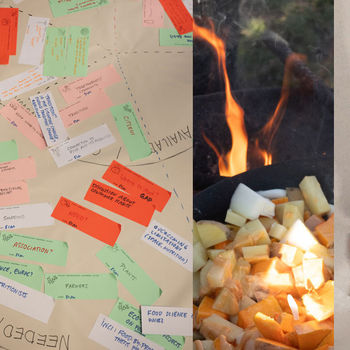
Thesis Preparation Project
In the third semester, students of the Master’s programme in Eco-Social Design develop the conceptual, theoretical and practical foundations for their theses.
The studio course provides an opportunity to explore and experiment theories and strategies of transformation, alongside case studies and empirical research. Students develop their projects’ conceptual framework, establish connections with collaborators, allies, and partners, while investigating technical aspects, co-creative processes, tactical interventions, and methods such as prototyping, mapping, visualisation, and storytelling. Critical reflection, economic considerations, and future perspectives are integrated, culminating in a plan for the further development of the thesis project. The outcomes are presented through a written document, a public presentation, and an exhibition at the end of the semester.
Teachers and researchers contribute through lectures, presentations, and workshops, facilitate group discussions, organise guest events, and lead site explorations, reading circles, and collaborative activities. Students are encouraged to actively contribute their ideas, skills, and knowledge, as well as propose and organise activities, either independently or in collaboration with the faculty.
Independent work and initiative are central to the course, with an emphasis on resourcefulness and self-direction in project development. Active participation in group activities, attendance at studio meetings, colloquia, and reviews, as well as consistent production, are essential. Sharing knowledge and ideas with peers enriches the learning experience and contributes to personal growth. Collaboration, collective empowerment, and mutual support are critical in navigating the challenges of transformation, including inevitable frictions and contradictions. Through critical reflection and iterative co-creation, students learn to address dilemmas, unintended consequences, and the experience of feeling overwhelmed, building the resilience and lightness needed to move forward in their practices.